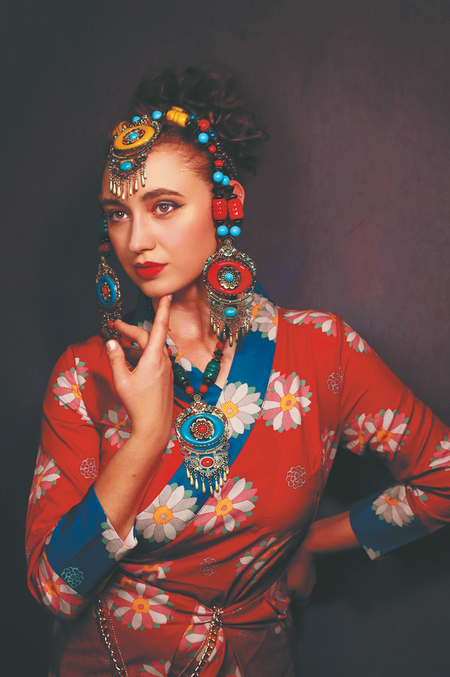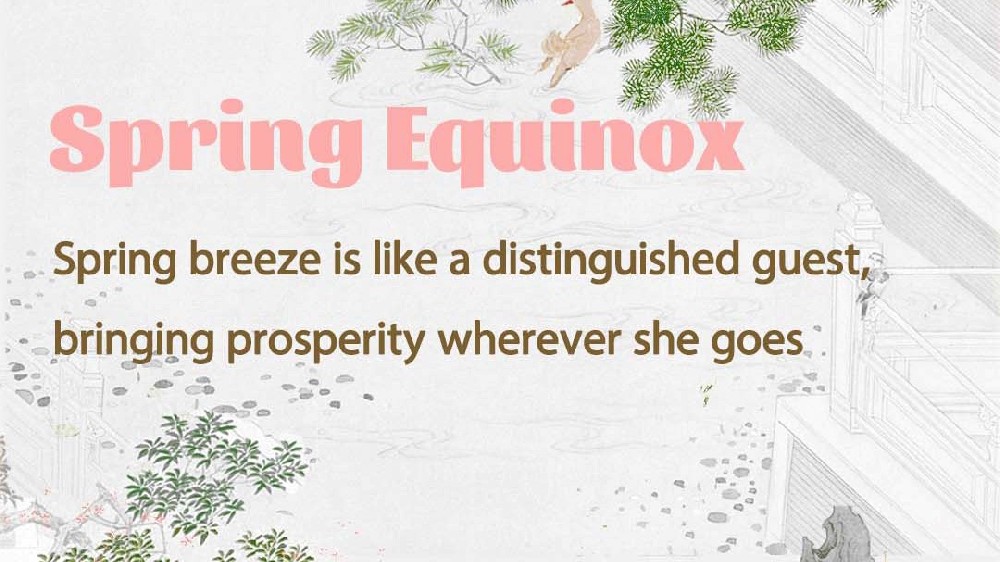A Russian who is well-versed in Chinese

Anastasia Podareva is a fan of the clothes and accessories of the Tibetan people. CHINA DAILY
Language student expresses her passion for China through poetry, reports Chen Xue.
Born in Ryazan, Russia, the hometown of Russian poet Sergei Yesenin, it seems that Anastasia Podareva is destined to follow a similar career.
Podareva, 28, has loved poetry since she was a girl, when her father would introduce her to works by great Russian poets such as Alexander Pushkin and, of course, Yesenin. Growing up, she wrote many poems in both Russian and English and, after she came to China to study in 2013, the world of Chinese poetry opened up before her.
She soon gave herself a poetic Chinese name, Tang Xilan, with "tang" alluding to the Tang Dynasty (618-907), when Chinese poetry entered a golden age, and both "xi" and "lan" are characters taken from The Book of Songs, the earliest collection of Chinese poetry. Her name means an orchid that blooms in the morning.
"One thing that strikes me in reading and writing Chinese poetry is the power of the language — its melodious and rhythmic," says Podareva in My China Surprise, a video series produced by 21st Century, a media organization affiliated with China Daily.
In fact, one can easily tell from the name of The Book of Songs that the earliest Chinese poetry was meant to be sung.
Podareva has had colorful experiences in China over the past decade. She has won awards in multiple poetry writing competitions, published her own Chinese poetry collections, and participated in Chinese Poetry Conference, one of the leading poetry-themed TV programs in China.
On top of that, her most unforgettable memory is of one of her poems being turned into a song.
And even better: She sang it herself.
The poem, titled If, was written in early of 2020 at the beginning of the COVID-19 pandemic.

Anastasia Podareva participates in the filming of a video to promote tourism in Hangzhou, Zhejiang province. CHINA DAILY
After witnessing China's unity as it faced adversity, Podareva felt as one with the Chinese people.
"I wanted to create something positive to help boost people's spirits in times of difficulty," she says.
"Some people may praise China in a very straightforward way, but I prefer to express my feelings about the country through different styles of verse."
As the poem goes, "I have come to love this land, growing up with its valiant people ... And with the profound love of a maiden of the north, I'd let China take my burning heart," Podareva wrote, depicting the friendship between China and Russia and showing her support for her adopted home.
And her message was heard. The poem was published online and picked up by Zhu Hai, 57, a music lover in Wenzhou, Zhejiang province.
He put the poem to music, contacted Podareva through her school, and sent it to her.
Last month, the two finally met in person in Shanghai, three years after speaking with each other for the first time, and recorded If together in a studio, with Podareva singing and Zhu accompanying her with a harmonica.
"I believe that singing is the ultimate way of expressing Chinese poetry, because Chinese is really a language that rises, falls and flows like music," she says.
But to Podareva, the meeting with Zhu didn't just stop at poetry. There is something more to it: It's a microcosm of the friendship between China and Russia.
Podareva has always wanted to be a cultural ambassador between the two countries.
In 2020, she created accounts on video-sharing websites in China, such as Bilibili and Douyin, and started making videos. Besides sharing new Chinese poems that she'd written, Podareva would also produce content based on cultural comparisons, for example, how Yesenin and Li Bai, one of China's greatest poets from the Tang Dynasty, depicted winter.
"I believe we should focus on literature when developing mutual understanding between China and Russia, because by looking at the literature of a certain nationality, one can see a lot about its culture and customs," says Podareva.
That said, being a young social media content creator, Podareva also makes humorous videos, the kind that, for example, demystify some of the misunderstandings that Chinese people have toward Russians, such as whether Russian people keep bears at home and whether they were born knowing how to pronounce the "Rrrr" sound.
Podareva has posted more than 230 videos and has more than 30,000 followers on Bilibili alone.
Apart from writing poetry, Podareva has also been painting since studying for her master's degree in art theory at Zhejiang Sci-Tech University in Hangzhou, the provincial capital, after graduating from the same college with a degree in Chinese language and literature.
She doesn't think the two art forms are that different from each other, offering the example of Wang Wei, another great Tang Dynasty poet, who was also a painter.
"Song Dynasty (960-1279) poet Su Shi once commented on Wang's poems and paintings, 'in reading Wang's poems one sees pictures, upon seeing Wang's pictures one senses poetry', so I think the two types of art are intertwined, inseparable," says Podareva.
And her painting is just as good as her writing. In December, Podareva held a solo exhibition at Changshuo Cultural Center in Shanghai with 66 of her paintings on display.
"My paintings and my poetry are very much alike: My painting style is mainly abstract, while I also tend to leave some gaps in my poems so that readers can fill them with their own imagination," says Podareva.
"All art, regardless of form, is a way for the creator to express their soul."
Podareva says she hopes that, in the future, she can open accounts on Russian social media sites, uploading videos that introduce China — through her poetry and paintings — to her own compatriots, just like what she has been doing here for the past three years, so that the friendship between the two peoples will also bloom, like an orchid.

